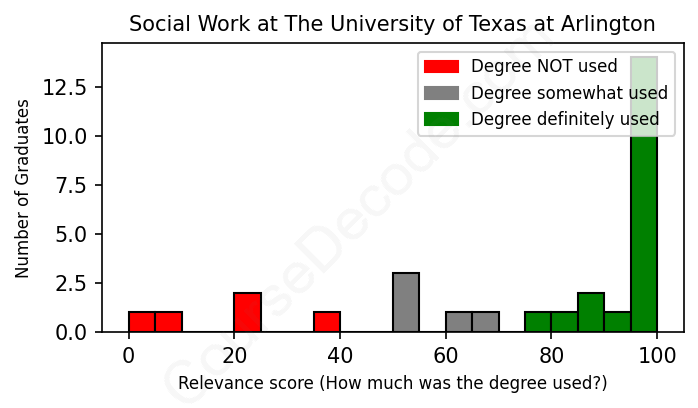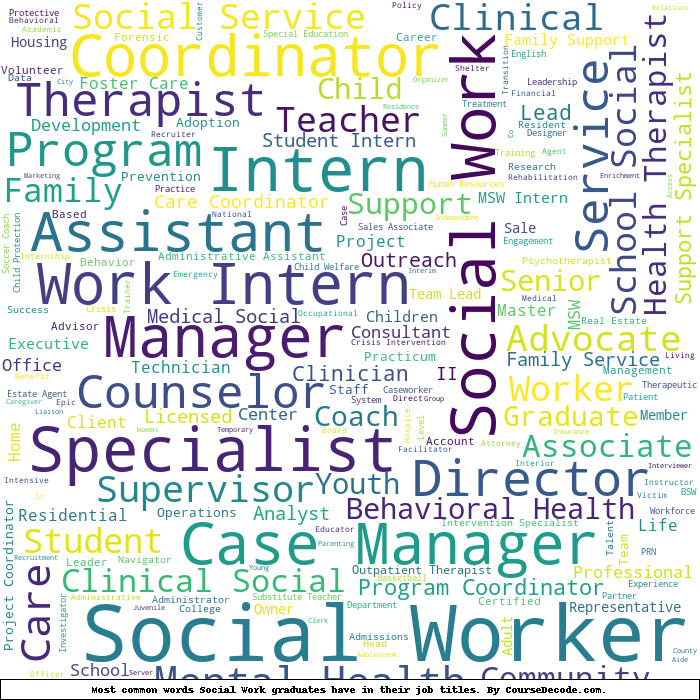
First, some facts. Of the Social Work graduates from The University of Texas at Arlington we've analyzed , here's how many have used (or NOT used) their degree in their career:

These are estimates based on AI analysis of 29 LinkedIn profiles (see below).
The verdict? Above average. Overall, with an average relevance score of 75%, Social Work graduates from The University of Texas at Arlington have a higher likelihood (+8%) of finding work in this field compared to the average graduate across all fields:
And for comparison, here's the chart for all profiles we've looked at across all degrees.
Also, after graduating, 75% of these graduates have pursued further education other than another Bachelor's degree (such as a Masters degree or other), compared to the average across all profiles of 35%. This suggests you may need more than just a Bachelors degree to be competitive as a Social Work graduate.
See the details:
|
Relevance score: 100% We think this person has gone into a career highly relevant to their degree. We think this person has gone into a career highly relevant to their degree.
DEGREE INFOGraduated in 2018 from The University of Texas at Arlington with a Bachelor's degree in Social Work. Also pursued further education since (see below). JOB HISTORY SINCE GRADUATIONIntake Manager Carrus Behavioral Hospital Dec 2020 - Jul 2021 Behavioral Health Therapist  TEXAS HEALTH SEAY BEHAVIORAL HEALTH CENTER PLANO Feb 2021 - Jul 2021 Assessment Coordinator  Mayhill Hospital Jul 2020 - Present FURTHER DEGREES DONE SINCE GRADUATINGMaster of Social Work - MSWUniversity of North Texas 2018 - 2019 ABOUTNo information provided. |
The top 10 most common jobs done by the graduates we've analyzed (ranked most common to least) are:
From examining the LinkedIn profiles of graduates from The University of Texas at Arlington who earned a degree in Social Work, it's clear that many have pursued roles deeply rooted in direct service and support within their communities. Common job titles among these individuals include Case Manager, Social Worker, and various positions within the Texas Department of Family and Protective Services. Many of these roles involve working with vulnerable populations, such as children in protective services, individuals experiencing homelessness, or those with mental health needs, indicating that their jobs are actively engaging with the core principles of social work. This highlights the strong alignment between their educational background and the fields they have entered.
However, not all job trajectories reflect a straightforward path into social work. Some graduates have taken on roles that seem only tangentially related, like positions in sales, insurance, or technical support, which don’t employ the core competencies of social work. While these jobs may involve some transferable skills, such as communication and leadership, they lack the direct application of social work principles that many graduates might expect given their training. On the whole, while a significant number of graduates pursue careers that closely align with social work, others find themselves in roles that diverge from their academic focus, leading to a mix of relevant and less relevant career paths post-graduation.
Here is a visual representation of the most common words in job titles for Social Work graduates (this is across all Social Work graduates we've analyzed, not just those who went to The University of Texas at Arlington):

Graduates from The University of Texas at Arlington with a degree in Social Work often follow a career trajectory that reflects a commitment to helping others, particularly in social services and community support roles. Many of these graduates start out as case managers or social workers, often taking positions with organizations like the Texas Department of Family and Protective Services or various nonprofits (like Catholic Charities). This makes sense, as it's common for new graduates to seek roles that directly utilize their training and provide hands-on experience in the field. For many, their first jobs after graduating align well with their long-term career goals, allowing them to gain practical skills and build a network in social work.
As time goes on—around five to ten years after graduation—many graduates progress into higher-level roles, such as directors or managers in social service organizations and healthcare systems. Some have moved into specialized areas, like mental health therapy or legislative roles, reflecting a diversification in their career paths. While it's clear that a significant number of UT Arlington social work alumni find success and fulfillment in their careers, not everyone stays strictly in social work. A few have transitioned into unrelated fields, but data shows that the majority remain dedicated to social services, which is a positive indicator of the program’s effectiveness in preparing graduates for careers in their chosen fields. Overall, there seems to be a strong alignment between their education and their work, showcasing the meaningful impact they have in their communities.
Getting a Bachelor’s degree in Social Work at The University of Texas at Arlington can be a bit challenging, but it really depends on your interests and how much effort you're willing to put in. The coursework covers a lot of ground, like psychology, human behavior, and social justice, so if you’re passionate about helping people and engaging with communities, it can actually be quite rewarding. Some students find the field placements and hands-on experiences tough but valuable, while others might breeze through the theory classes. Overall, it’s not super easy, but it's definitely manageable if you stay organized and motivated!
Most commonly, in the LinkedIn profiles we've looked at, it takes people 2 years to finish a Bachelor degree in Social Work.
So, when we look at these Social Work grads from The University of Texas at Arlington, it seems like they’ve mostly been in jobs that are on the lower end of the pay scale, especially for the social services field. Many have worked as case managers or in entry-level positions for non-profits, which typically don't pay super well, especially in the beginning. While there are some mid-level roles and a few higher positions like therapists or managers, overall, it pulls toward that “not-so-great” income bracket. You know, social work can be super rewarding and important, but tons of folks in this field struggle with financial stuff. So, if you’re thinking about going into social work, just know that you might be more passionate about making a difference than raking in the big bucks!
Here is a visual representation of the most common words seen in the "about" section of LinkedIn profiles who have a Bachelor degree in Social Work (this is across all Social Work graduates we've analyzed, not just those who went to The University of Texas at Arlington). This may or may not be useful:

Here are all colleges offering a Bachelor degree in Social Work (ordered by the average relevance score of their Social Work graduates, best to worst) where we have analyzed at least 10 of their graduates: